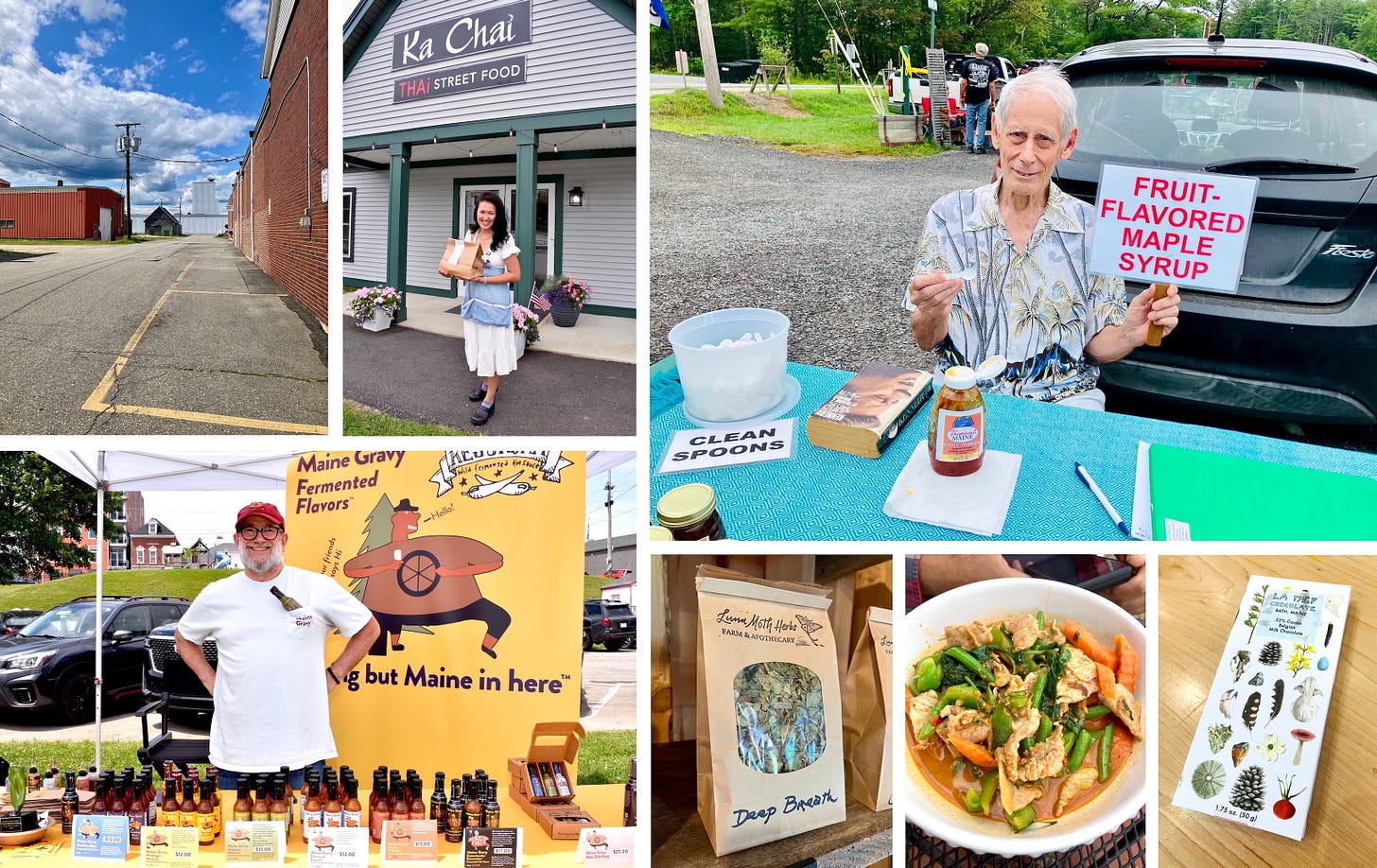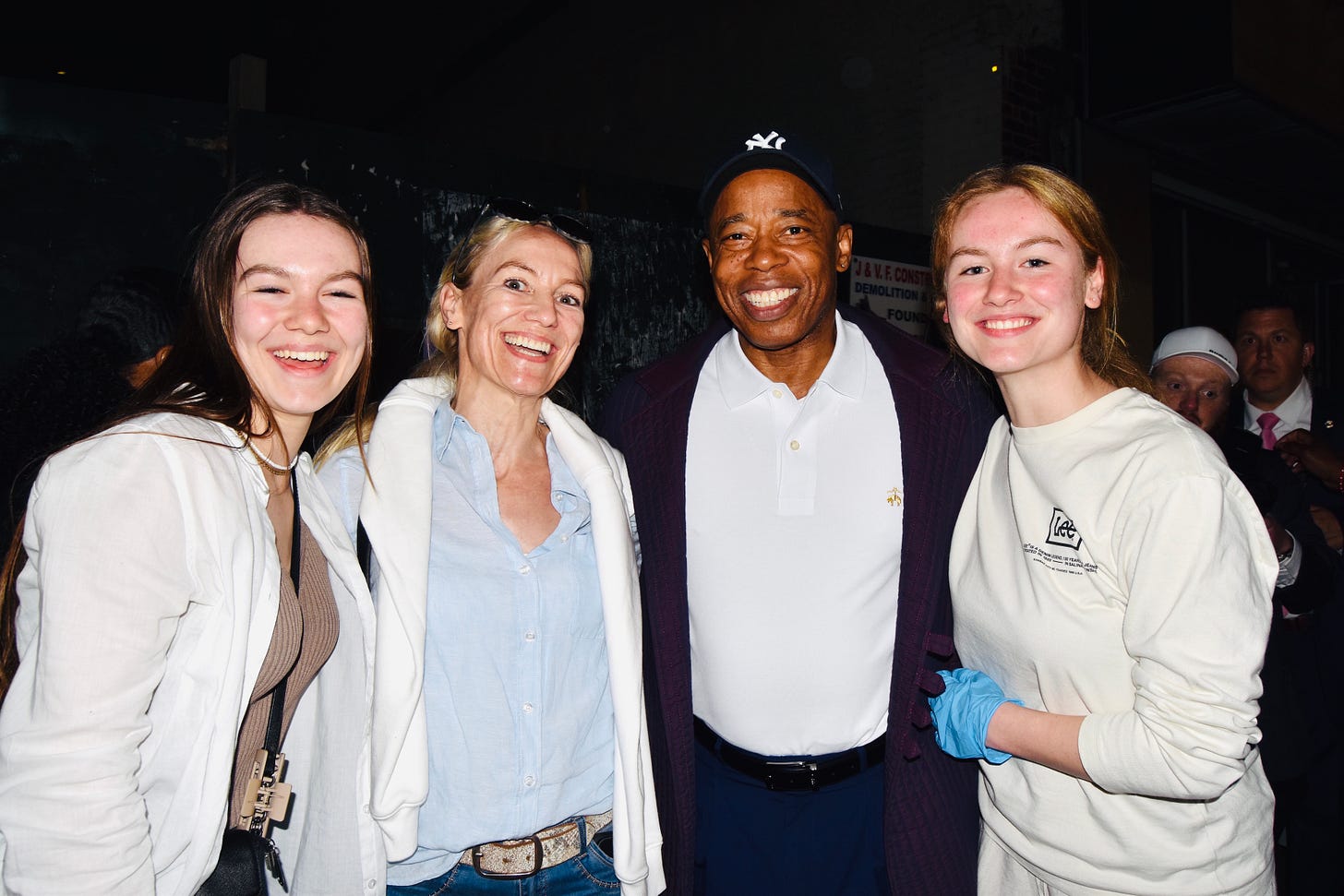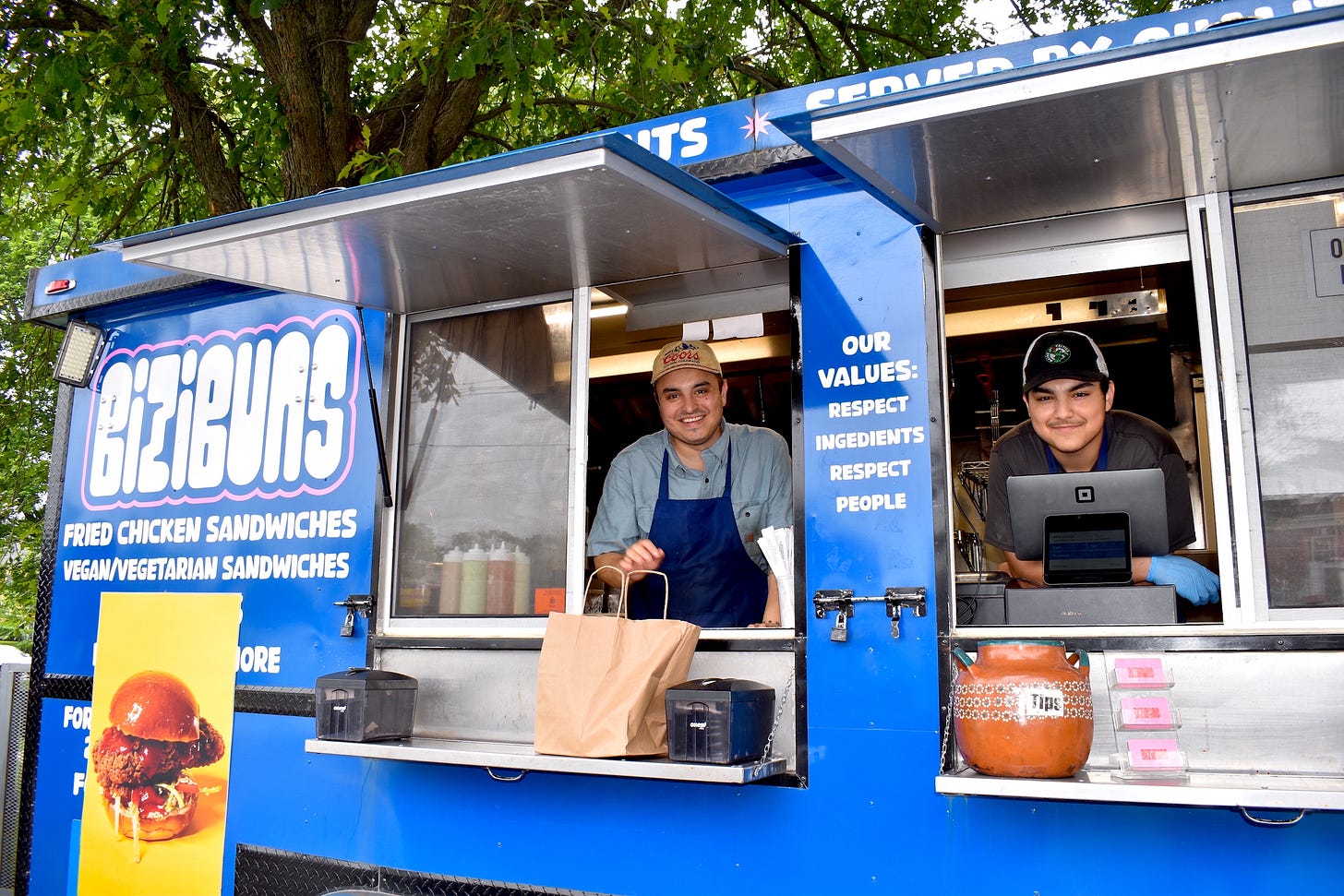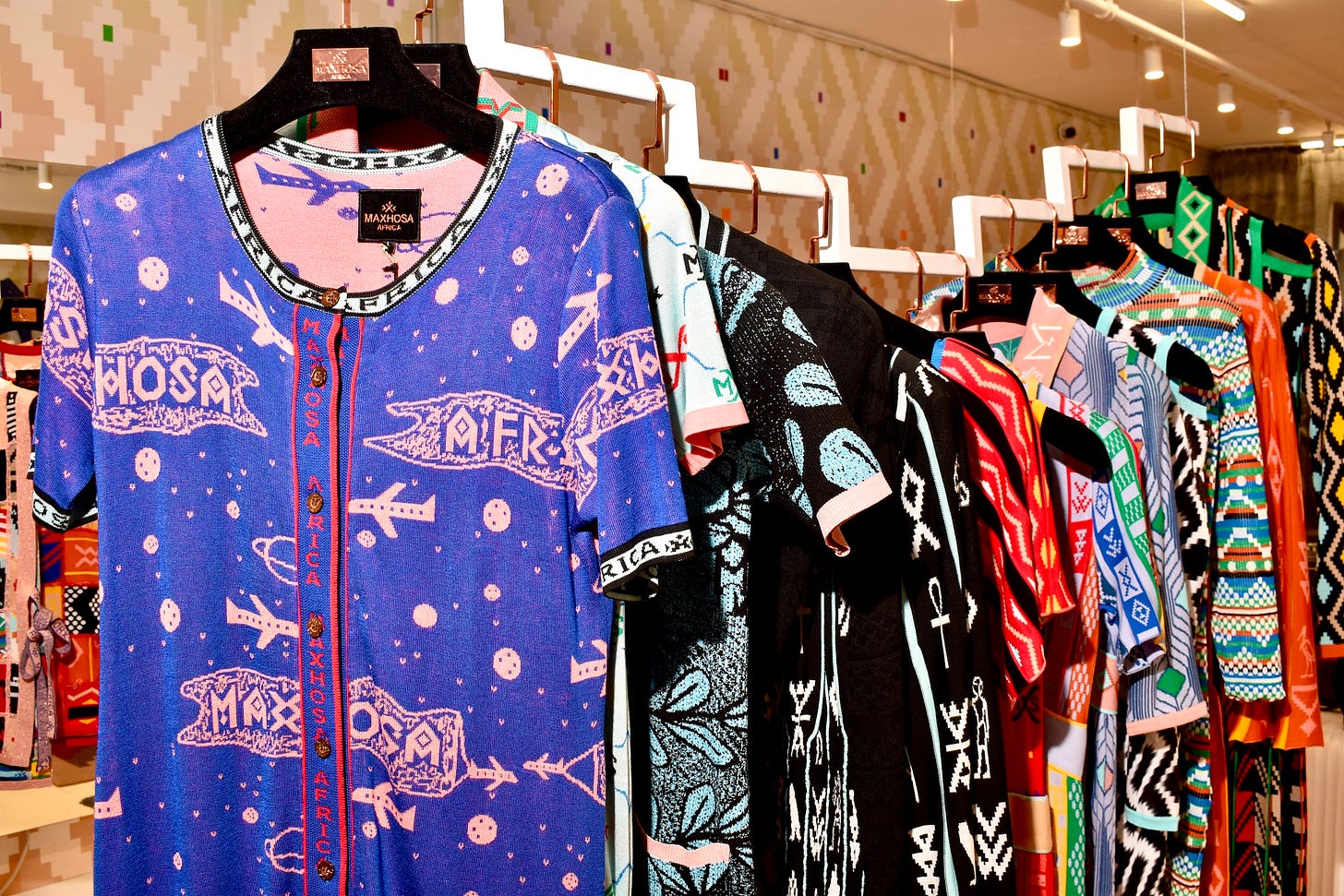NYC's Mercantile Mayhem: Detour to Maine, Mayoral Candidates' Policy Plans for Small Biz, Brian Hamilton on Private Equity vs Free Enterprise, Main Street Survey and Global Apparel
A newsletter about the survival of independent businesses in New York City with a focus on immigrant-owned, storefront retail and CPG enterprises.
I was recently galavanting about the rocky coast of Maine. Yes, I missed the epic Fancy Food Show in New York City, which I normally attend, but I glanced at social media to see the three days of fun and frolic. However, I’m always on the prowl, so I discovered and revisited all sorts of independent businesses in Maine, from retail shops and food trucks to hot sauce and chocolate makers.
I interviewed Bizhan Eslami a couple years ago when he first launched Bizibuns. Eslami, who combines a sprinkling of flavors from Iran, where he was born, enhanced with some East Asian tastes, says Bizibuns business has been good and is growing. I ordered the spicy chicken sandwich—which was nothing short of astounding—that had a sublime Korean and Persian inspired hot sauce, topped with coleslaw made with cabbage, carrots, leeks and bell pepper. The second sandwich was also divine, a tofu and mushroom ensemble, topped with special slaw.

I tried to visit Bixby Chocolate but it was closed for the 4th of July. As a consolation, I did get some good shots of Rockland’s marine repair and storage neighborhood, where Bixby is located. Gina made excellent Chicken Pad Thai (so sue me, I also like eating Chicken Tikka Masala at Indian restaurants…) at her restaurant Ka Chai Thai Street Food in Thomaston. I looooved Jon Olsen’s marketing technique to sell his passionfruit maple syrup, it worked like a charm on me, I bought a jar.
La Nef Chocolate was first launched on Monhegan Island, now located in Bath, and has gorgeous packaging made by artists, most with connection to Maine. Can you get Laotian food in Maine? Yes you can! We had a delicious meal at Laan Xang Cafe in Belfast. I only ogled Luna Moth Herbs, so I can’t vouch for them, but I did try Dick Chase’s fermented Maine Gravy hot sauces. I thought I should buy his Midcoast Mayhem in honor of this newsletter’s name, but since I have a freakishly high tolerance for spice/heat, I bought Damariscotta Damnation made with ghost peppers.
Now back to the big, bad city…
INDEPENDENT BUSINESS OWNERS IN NYC, WHO ARE YOU VOTING FOR? MAMDANI, CUOMO, ADAMS OR SLIWA?
Anything could happen in the New York City mayoral race between now and November 4, election day. I’m curious if independent business owners in NYC have a candidate in mind, based on policies that specifically aim to help small businesses. Are the plans put forward by Mamdani, Cuomo, Adams and Sliwa just a bunch of hot gas? How realistic are their proposed policies? Can they be implemented? What are the policy plans that could help or harm your independent New York City business? Inquiring minds want to know!
While all policies—housing, education, affordability, corruption, crime, environment, etc—are interrelated and can impact aspects of independent businesses, I’ve collected a few policy ideas from Mamdani, Cuomo, Adams and Sliwa that relate to small business owners. I highlighted their policy ideas in bold with my questions and/or comments afterwards.
Zohran Mamdani, the Democratic candidate.
Raising minimum wage to $30 per hour by 2030. Today, NYC’s minimum wage is $16.50 per hour. Would the majority of independently owned businesses afford the near doubling of payroll by 2030? What would be sacrificed?
City-owned grocery stores selling products at reduced prices. Massive corporate entities like Whole Foods and Trader Joe’s would probably be fine in terms of competition, as would hyper artisanal shops. But would smaller supermarket chains like Jubilee Marketplace or Union Market be able to compete? What about the corner bodega? Where would the estimated $60 million come from to launch the first five stores?
Rent freeze on rent stabilized residential apartments. I’d love to know if Mamdani has any policy plans on commercial rents. Neighborhoods with heavy foot traffic have commercial rents that I would call insane—a 1,200 square foot Chelsea vented space costs $18,500 per month, a Williamsburg vented space of 1,000 sq ft is $15,000 per month plus key money. Never mind the rents for prime locations like Union Square. What about a freeze on corporations purchasing buildings?
Have a “mom and pop [small business] czar” that would report to Mamdani.
Cut fines and fees for small businesses by 50 percent; speed up the bureaucratic process of launching a business.
Invest $20 million in BEST (Business Express Service Teams) that helps founders navigate applying for city permits, regulation compliance and other systems. More funding for NYC small business programs.
Andrew Cuomo, will run as an Independent.
Expand MWBE (Minority and/or Women owned Business Enterprise) programs to a 30% participation rate and 35% by 2030.
Raising minimum wage to $20 per hour in New York City by 2027. According to this NYT article Cuomo suggested a tax credit for those businesses with ten or fewer full time employees.
Curtis Sliwa, the Republican candidate.
Freeze property tax for the small landlords. Would there be a mandatory rent freeze on commercial spaces if these buildings have them?
Redirect city incentives from corporate developers, to local businesses. Does this include corporations like Amazon? Would Sliwa ban corporations purchasing buildings?
Cancel congestion pricing, “Which has been a disaster,” according to Sliwa, to get more visitors in downtown Manhattan. But according to a May 2025 New York Times article, the number of visitors/tourists to the congestion zone has been slightly up.
Give communities control over zoning decisions.
Promises to combat shoplifting. Sliwa wants 7,000 more NYPD on the street, but would that stop shoplifting? Maybe, but from what I’ve heard from shop owners is that shoplifters often get a slap on the wrists at arraignment or a plea deal afterwards, so shoplifting continues. Shop owners are in a difficult position: most do not want to send a shoplifter to Rikers Island, known to be hell on earth, for shoplifting a $50 item, yet many independent storefront retailers scrape by and can’t afford to have merchandise shoplifted. Not to mention it’s creepy to have a thief in your store.
Invest in revitalizing business districts in four boroughs: Queens, Brooklyn, Staten Island and the Bronx that are in decline. How would Sliwa invest/revitalize?
Mayor Eric Adams, will run as an Independent. As the incumbent, Adams is putting forth his track record on small business policies to illuminate his future policies.

“Small Business Forward 2.0” re-ups the program to cut the city bureaucracy when opening a small business with with Small Business Services (SBS), which first launched in 2022.
Adams launched the NYC Future Fund in 2024, revenue-based small business loans.
NYC awarded $6.3 billion in contracts to MWBE (Minority and/or Women owned Business Enterprise) firms and according to Adams is on track to award $25 billion in contracts to MWBE firms by 2026.
According to a New York City Economic Development Corporation (NYCEDC) report last year in 2024, the city now has 183,000 small businesses, the most recorded in city history.
Jim Walden, will run as an Independent.
Wants to support small business. I couldn’t find much about Walden’s policy plans on small business.
Independent business owners, if you feel comfortable, please let me know who you are voting for, or leaning towards, and why, by replying to this email. Thank you!
PRIVATE EQUITY AND THE FREE ENTERPRISE SYSTEM
This Fortune essay by Brian Hamilton who is an an entrepreneur and founder of Brian Hamilton Foundation, highlights how private equity is undermining the competitive spirit that keeps entrepreneurship alive and thriving. There are different types of private equity firms, some buy troubled businesses, sell them for parts. Others buy and consolidate multiple tiny businesses or act similar to VCs, funding a startup that aims to scale off the charts. There are decent PE firms, like Prelude Growth Partners, for example, but the end result of most PE investments is often a concentration of power and money, which makes competition challenging for independently owned businesses.
Take New York City veterinarians for example, where we bring our beloved pets for care. Individually owned veterinarian offices are now few and far between (I bring Osmo to a beloved neighborhood veterinarian in the Gramercy Park area). There is a proliferation of PE- or VC-funded chains like Bond Vet, which has received $243 million from investors and Small Door Vet, which has received $63.5 million from investors. How can a solo veterinarian compete with that kind of concentration of power and money?
Lina Khan, the former chair of the Federal Trade Commission (FTC) fought to minimize monopolies and duopolies that squash healthy entrepreneurial competition. I don’t know if Andrew Ferguson who now holds the position is as passionate about entrepreneurial competition.
We could soon have the most bland New York City streets with zero personality and chain stores galore if the city can’t figure out how to keep independent storefront businesses in fair competition. In Brian Hamilton’s essay he suggests encouraging employee owned businesses, which in theory sounds good, but entrepreneurs are typically too individualistic to be part of an employee owned business. It would be rare for group of people to have the exact same vision, ambition and ideas around business and growth, it can be the proverbial too many cooks in the kitchen scenario.
Many independent business owners I talk with in New York City are getting by, but just barely. Should regulation come from top city officials down? Perhaps commercial rent stabilization? (This has been tried before and it died.) Zones exclusively for individually owned businesses? Tax breaks for landlords who offer below market rate commercial leases? Tax relief for owners of historic businesses that attract tourists to a neighborhood?
THE VOICE OF MAIN STREET SURVEY
Small Business Majority, yes, one of this newsletter’s dynamic sponsors, is interested in knowing the challenges entrepreneurs are currently facing. If you are a small business owner and want your voice heard, please take a moment to fill out the Small Business Majority quarterly opinion poll: The Voice of Main Street Survey, which has a focus on tariffs and healthcare. It should only take 10 minutes.
THE WORLD AT YOUR FINGERTIPS: APPAREL EDITION
The celebration of New York City’s independent businesses continues with Accompany Capital’s The World at Your Fingertips series—why yes, Accompany Capital is another Mercantile Mayhem sponsor. The latest is a group of retail shops selling apparel and accessories imported from abroad, as well as locally made products inspired by global motifs.
Hellenic Aesthetic in Astoria, Queens was founded by Marianthi Vlachos who is second generation Greek. The shop carries Greek brands like Devotion Twins and Greek Archaic Kori among others, most are based in Athens. The shop also carries some items from US designers of Greek heritage and/or Greek inspired, like Kefi jewelry, designed by Stephanie Alman and Vlachos’s own jewelry line. Yia Yia and Friends olive oil from Greece are a few edible items for sale, which includes Rise With Apollo coffee, a brand Vlachos started with her brother.

Maxhosa Africa on Canal Street in Soho is a modern, luxury brand from South Africa. The vibrant, colorful patterns are based on Xhosa aesthetics, the second largest ethnic group after Zulus. Founder Laduma Ngxokolo, who is Xhosa, started the knitwear brand with his grandmother. Maxhosa's knits use a flatbed knit process, so the pattern and color is identical on each side of the material (not the reverse). Maxhosa had been worn by Michelle Obama and Alicia Keys, among others.
Dö Kham in the East Village sells clothing, accessories and jewelry rooted in the Himalayas, Tibet and The Silk Road. Most apparel pieces are handcrafted, using colorful raw silks, silks, handwoven brocades and cottons. Founder Phelgye Kelden designs the elaborate traditional fur hats with both real and faux fur. Kelden was born in Tibet, fled to Nepal, moved to India, finally settling in NYC in the 1970s.
La Sirena in the East Village is a tiny shop selling Mexican apparel, accessories and folk art sourced from Mexico City, Chiapas, Puebla and Oaxaca, among other regions. Owner Dina Leor is a born and bred New Yorker, an Argentinian-American, but with "a Mexican heart" as she describes it. The shop has been in business for 25 years, carrying ponchos, dresses, shirts, sombreros, mens embroidered shirts, t-shirts, as well as bags and jewelry.
Thank you to Mercantile Mayhem’s sponsor Accompany Capital. Based in New York City, Accompany Capital, a CDFI, helps immigrants and refugees with loans and free financial services. Please read about it here.
Thank you to Small Business Majority, Mercantile Mayhem’s sponsor. Small Business Majority supports and empowers small businesses across the US with a focus on public policy. Please read here and their finance resource platform Venturize.
WOULD YOU LIKE TO SPONSOR MERCANTILE MAYHEM?
Yes, I am still looking for one additional sponsor, three in total, the individuals, businesses, organizations or foundations that believe independent businesses in New York City need to survive. Do you want a city full of just Chipotles, Starbucks and bank ATMs? Do you value the character that independent businesses bring to New York City?
If you would like to know sponsorship rates and newsletter stats (open rates and such) please email me: ninarobertsnyc@gmail.com and I’ll send you the details. Please forward this newsletter to others.
OPPORTUNITIES
Composting grant alert! For the first time LISR is offering composting grants to those in NYC, click here for details. Deadline is July 25, 2025.
WomensNet offers a number of grants to women-owned businesses on a rolling basis, peruse grant information here.
The grant cycle is open! Small businesses in New York City could win a micro grant up to $5,000 through CitizensNYC. Deadline is July 25, 2025.
NYC Boss Up Veterans, the pitch competition applications for veterans of the US military entrepreneurs open July 1, 2025. Children, siblings, spouses or parents of a Gold Star Family, or military spouses, are also eligible. Winners will receive a grant of $20,000. Applications close September 15, 2025, click here for more information.










The challenge is not just what’s proposed, but how feasible and well-resourced these plans are, and whether candidates truly understand the daily realities independent business owners face.